The Outer Worlds Review
November 4, 2019 | 17:00
Companies: #obsidian-entertainment #private-division
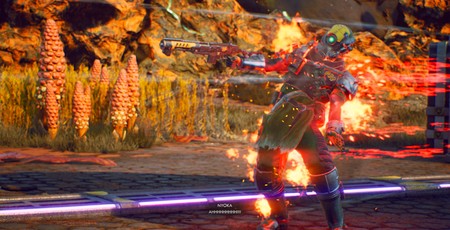
Price: £49.99
Developer: Obsidian Entertainment
Publisher: Private Division
Platform(s): PC, PS4, Xbox One
Version reviewed: PC
I was expecting The Outer Worlds to be Fallout 4 in space. I’d seen plenty of writing and footage of the game to know more or less what I was getting. But I’m still surprised by just how much The Outer Worlds is Fallout 4 in space. Not only does The Outer Worlds mimic Fallout 4’s virtues, such as the large open world and the kooky retrofuture vibe; it also mimics the game’s flaws, like the sludgy combat and that weird inertial glide Bethesda games have when moving around.

This isn’t to say The Outer Worlds is entirely unoriginal. It adds the 'in space' bit and also treats players to more of Obsidian’s entertaining writing and characterisation. But throughout my time with it, I couldn’t shake the sensation that I’d played this game before. I find it odd that Obsidian was so committed to replicating the look and structure of another game, often to the detriment of its own.
You start your adventure in The Outer Worlds as a space popsicle, one of hundreds of wannabe colonists who ventured to the budding Halcyon system on the spaceship Hope. But a combination of a drive malfunction and interstellar red tape means your ship has been left to drift for the best part of a century. It’s only through the intervention of Dr Phineas Wells – an absent-minded scientist and fugitive from the Halcyon Board of Directors – that you manage to escape. Phineas promptly sticks you in an escape pod and asks you to help him concoct more of his magic defrosting formula (not actually its name) so that he can revive the rest of your colony buddies.
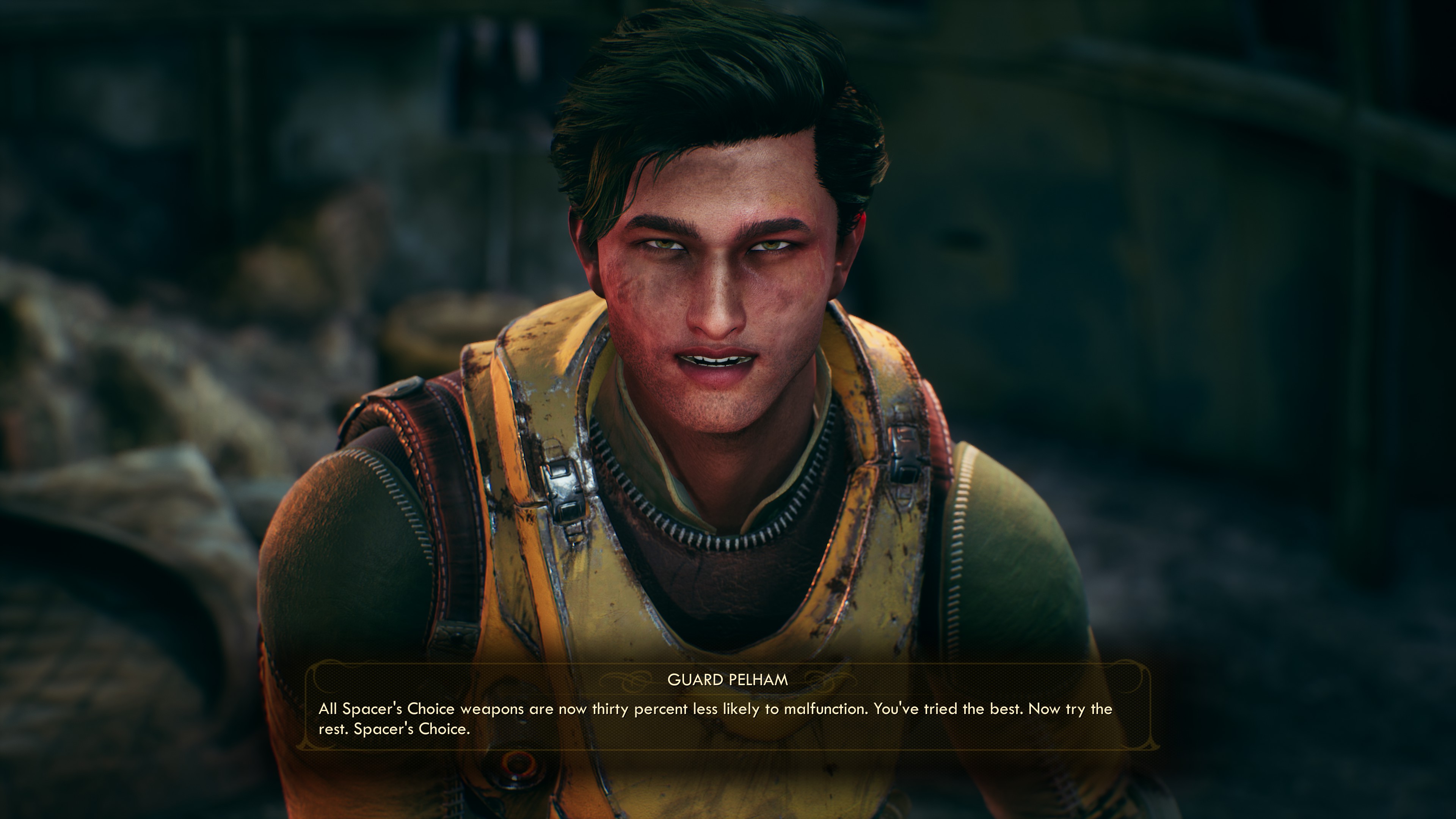
The Outer World’s decision to avoid the familiar “Chosen One” narrative is admirable, although I think it could have done with a slightly stronger central thrust. There were several moments while playing The Outer Worlds where I realised I had forgot what the main quest was, which isn’t great considering it isn’t that big of an RPG.
In its defence, The Outer Worlds is structured less like a sci-fi epic, and more like an adventure serial, albeit one with a more satirical edge. The various planets and planetoids of the Halcyon Colony are dominated by the Board, while the colonists have been well and truly indoctrinated into its materialist, hyper-capitalist way of thinking. An early quest sees you in a literal struggle for power between the colony-town of Edgewater, owned by a company called Spacer’s Choice, and an offshoot settlement attempting to thrive on its own. Both want you to divert energy from a nearby power station to their colony, leaving their rivals in the dark.
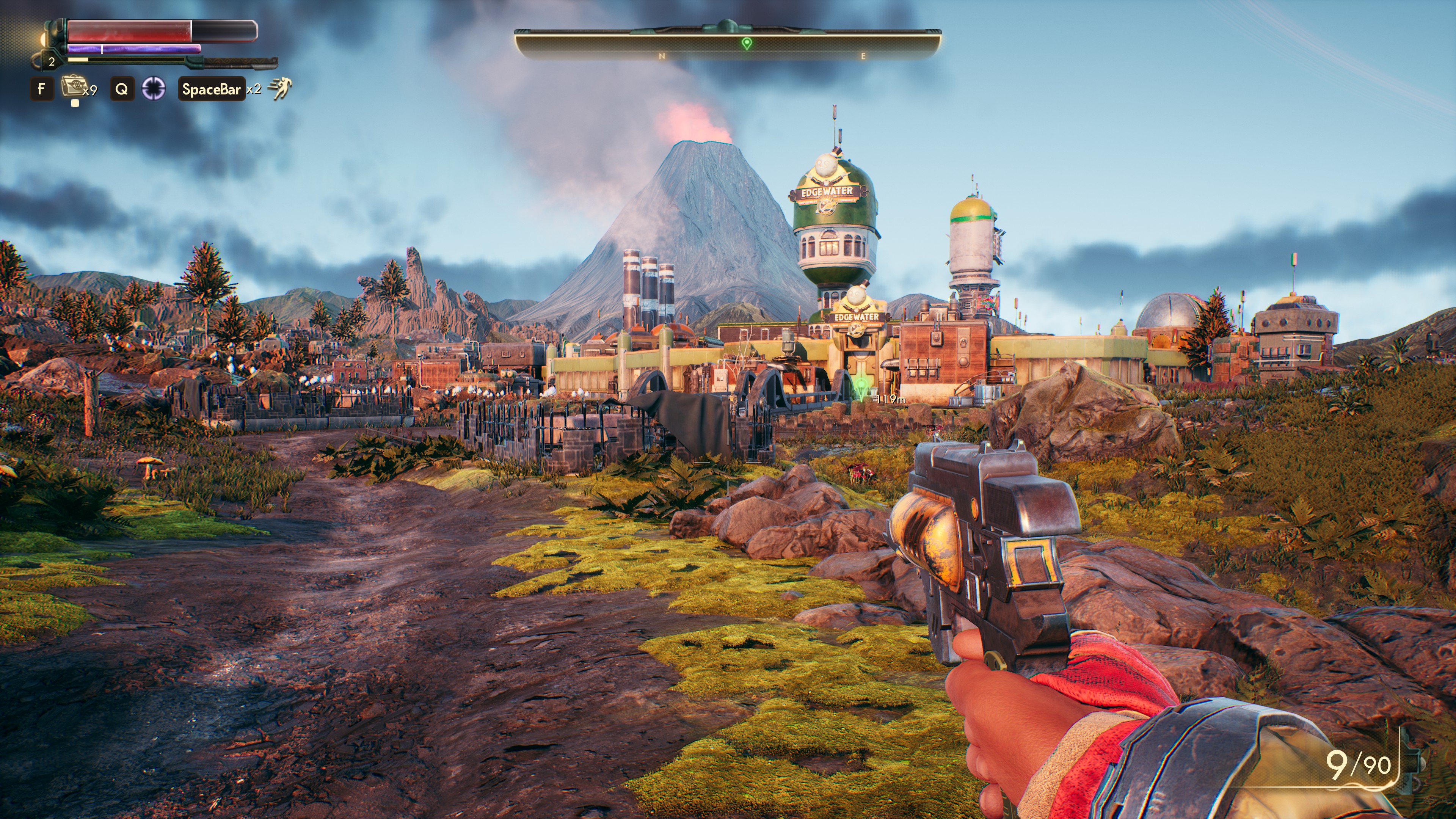
At first the choice seems obvious enough. The Spacer’s Choice colonists are worked to the bone by the colony leader for menial gain, while their absurd contracts result in bizarre situations like having to pay the rent on another’s person grave plot because they were the one who found the body. The offshoot settlement, on the other hand, distributes food and other resources equally, with the only condition being that everyone pitch in. But the Spacer’s Choice colonists are content with their meagre lot, having known no other form of existence. Meanwhile, the offshoot colony will only accept colonists from Spacer’s Choice if they recant the Spacer’s Choice philosophy, which they can’t do because it’s so deeply ingrained in their psychology.
I enjoyed The Outer World’s absurdist portrayal of corporate culture, from the gaudy adverts to the crummy processed food everyone eats, to the way everyone talks to you in corporate slogans with unnervingly bright-eyed expressions. But the bigger success of the The Outer World’s writing is how individual characters make you want to respond to them in different ways. Normally in an RPG like this I’ll assume a role and stick to it, usually a goody-two-shoes Paladin type who wants to please everyone. But in The Outer Worlds I was often happy to lie to people, to intimidate them, or just outright murder them, simply because I felt like they deserved it.
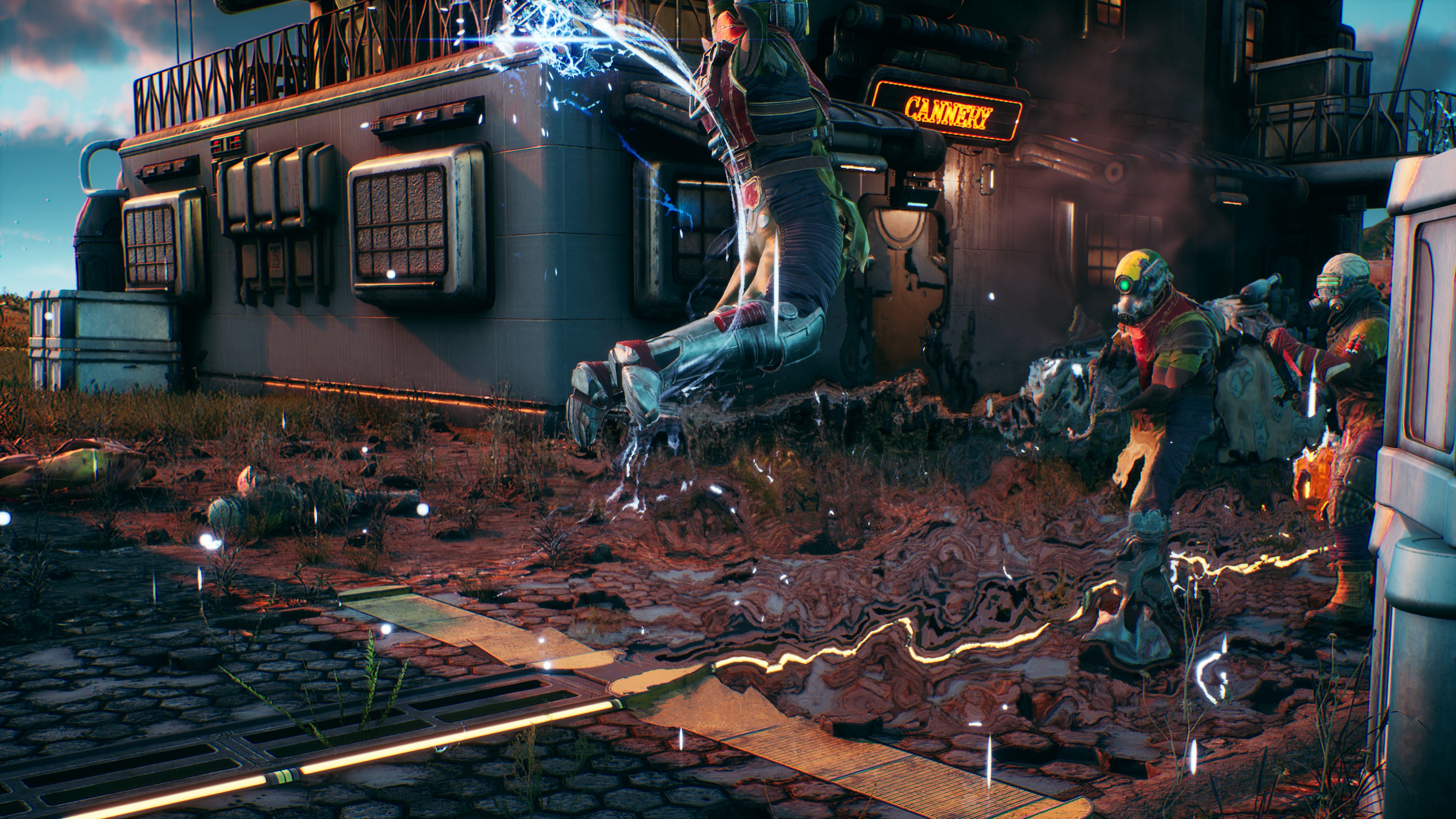
In one example, you’re asked by the grandmotherly head of a company to venture into a town in search of corporate secrets to steal. One such secret is a formula for a new type of toothpaste, which the inventor has been working on for most of his career. Not a particularly nice thing to do, but the creator of the toothpaste formula is a such an enormous, self-absorbed Prickasaurus Rex that I was quite happy to relieve him of his idiotic life’s work. I then sold it back to my original client claiming it was a formula for rocket fuel, because the whole quest felt like a massive waste of my time and I felt like I deserved a proper reward for it.
Your party characters are an equally motley and interesting bunch, although I’d argue a few of them score too highly on the Joss-Whedon scale of performatively quirky. Pavarti, the friendly, asexual mechanic who enjoys hitting things with a big hammer – either to fix them or to break them – is the character who gets talked about the most. But as the game went on I found myself warming toward Vicar Max, a preacher of Halcyon’s pseudo Catholic faith who turns out to be something of a dissident, as he searches for a heretical text to enhance his knowledge of the faith. He comes off as a bit of an arse at first, but there’s more to him underneath that, and I enjoyed his character arc such as it was.
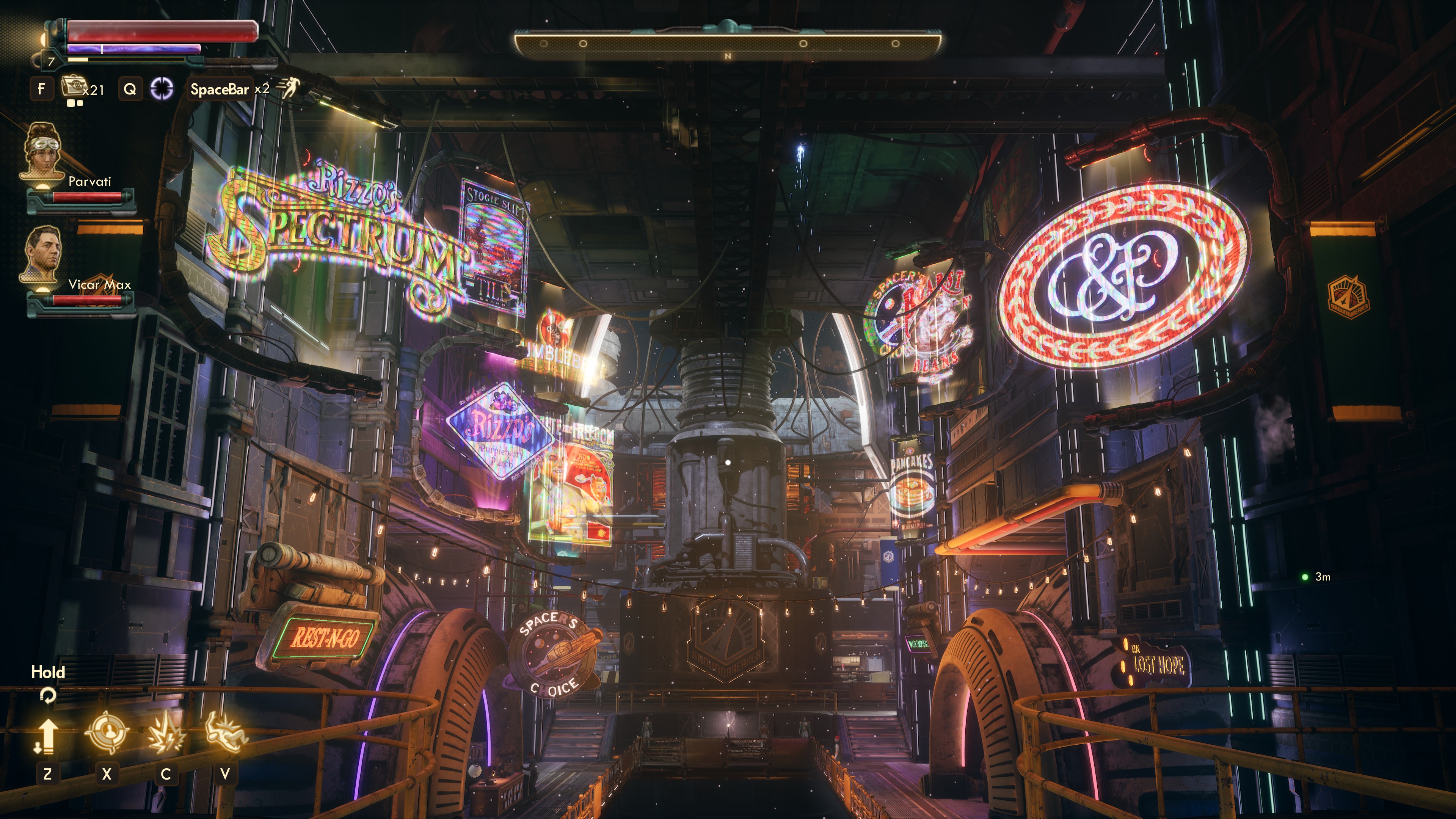
Obsidian also strives to ensure your party has a life beyond your personal orbit. As you explore, they’ll frequently converse with one another, and you’ll find them hanging out together on your ship, chatting, arguing, reminiscing about their past lives. The Outer Worlds almost succeeds in making your crew feel like a family in the way that Star Trek and Firefly do. It’s just a real shame the structure of the game means your companions spend most of their time off-screen.
The writing is great, the characters are good, and the quests enable a satisfying range of potential solutions. So where’s the problem? Well, it’s that the whole experience feels stodgy and staid. Let’s start with you. Character development and progression is quite literally by the numbers. Every level you put 10 points into several general categories like strength, dexterity and charisma. Once those reach level 50, you then put points into more specific sub-categories - hacking, persuasion, pistols, etc.
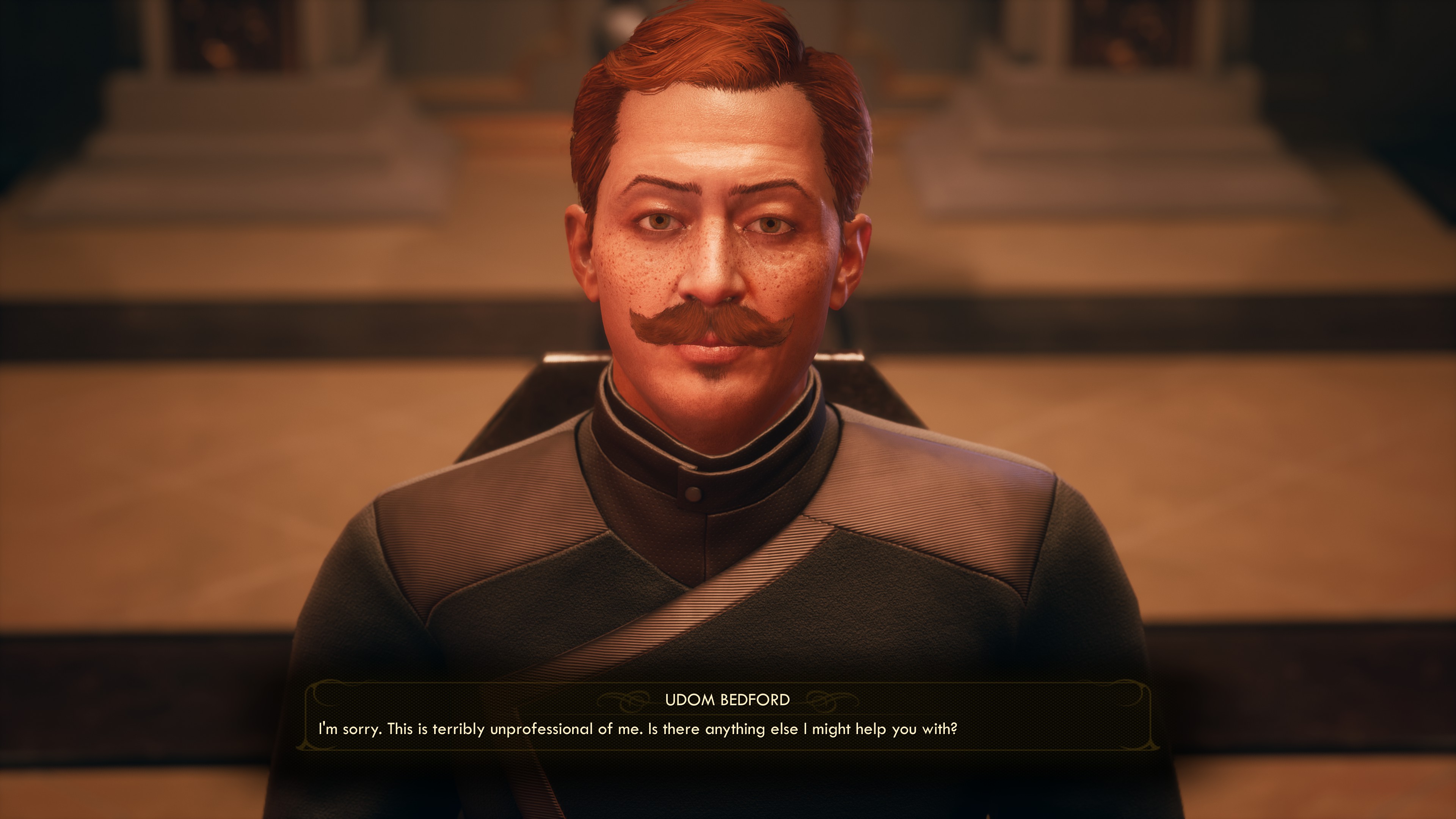
There are two problems with this. Firstly, nearly all your skill unlocks and perks are passive. At least Fallout had oddball abilities like 'Mysterious Stranger', stuff that actually made you go, 'Ooh, I want that,' whereas The Outer Worlds has very little that makes you excited about levelling up. At the same time, you very quickly become crazy overpowered. By the time your main skills have reached +50 points, you’ll breeze through the vast majority of skill checks and combat encounters.
Speaking of combat, The Outer Worlds' fighting is almost exactly like Fallout 4’s, only without Fallout 4’s most interesting combat mechanic – V.A.T.S. It tries to make up for this with kooky weapons like plasma carbines and shrink rays, alongside character abilities which are even more overpowered than your own skills. But it nearly always boils down to using the weapon that shoots the most numbers out of an enemy.
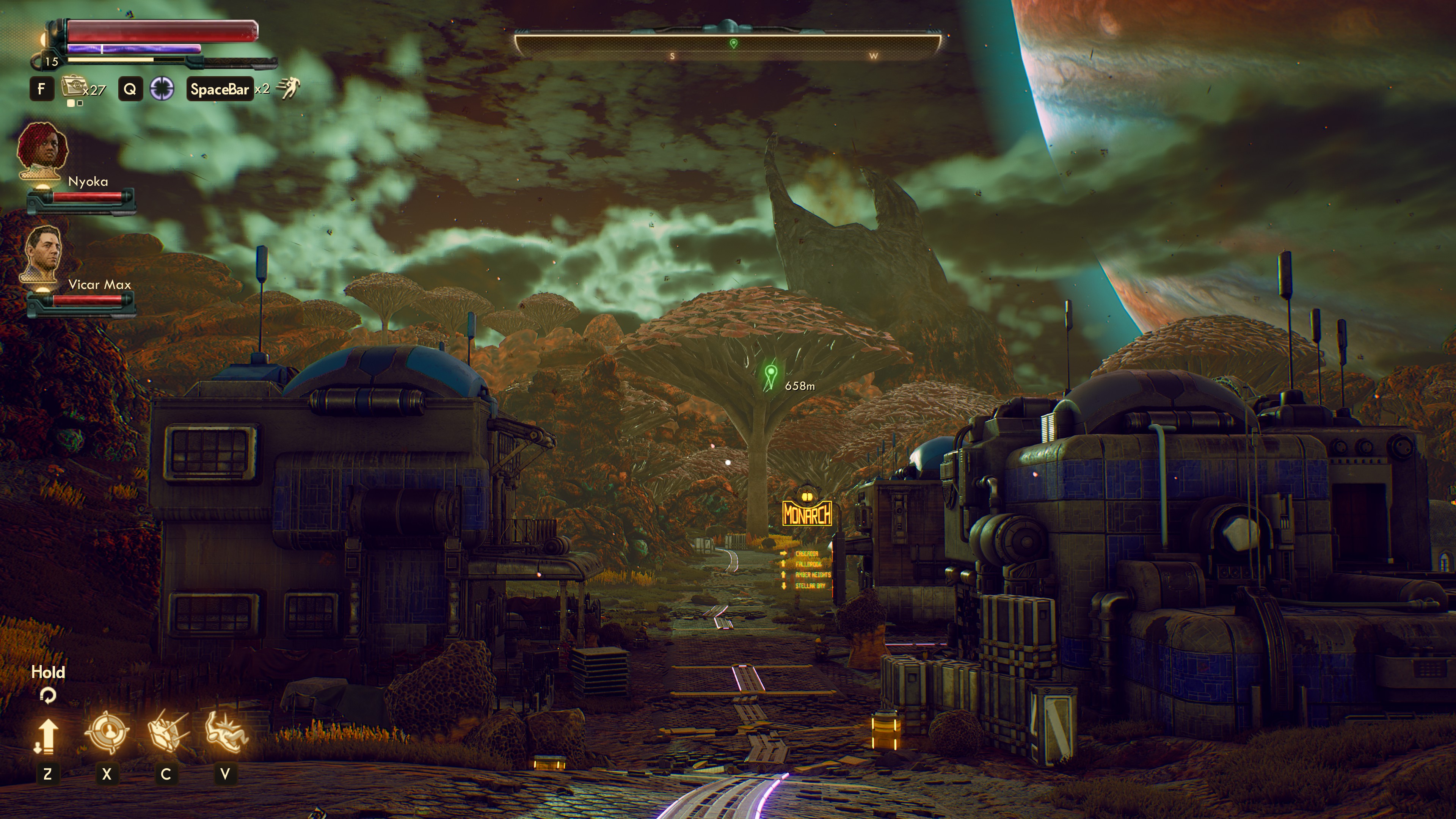
As a side note, Jesus gibbering Christ I am tired of shooting numbers out of things. Not only is it the most boring way to reflect damage, and also diminishes your ability to use weapons tactically, I also find it a bit…creepy, one step away from your enemies bleeding candy. It’s disingenuous and weird.
Right, back on track. I think part of the problem comes down to scale. Despite looking and playing very much like Fallout, The Outer Worlds is nowhere near as large. It’s still a substantive RPG, ranging between 20 and 30 hours depending on how thorough you are, but because it takes place on multiple planets, the individual areas are comparatively small. Interior areas are especially claustrophobic, lacking the space to approach combat tactically. Quests suffer from this issue of compartmentalisation too, with NPCs asking you to run errands that amount to a two-minute walk and a slightly awkward conversation. In one instance, I had to find a keycard that was literally on the table next to me.
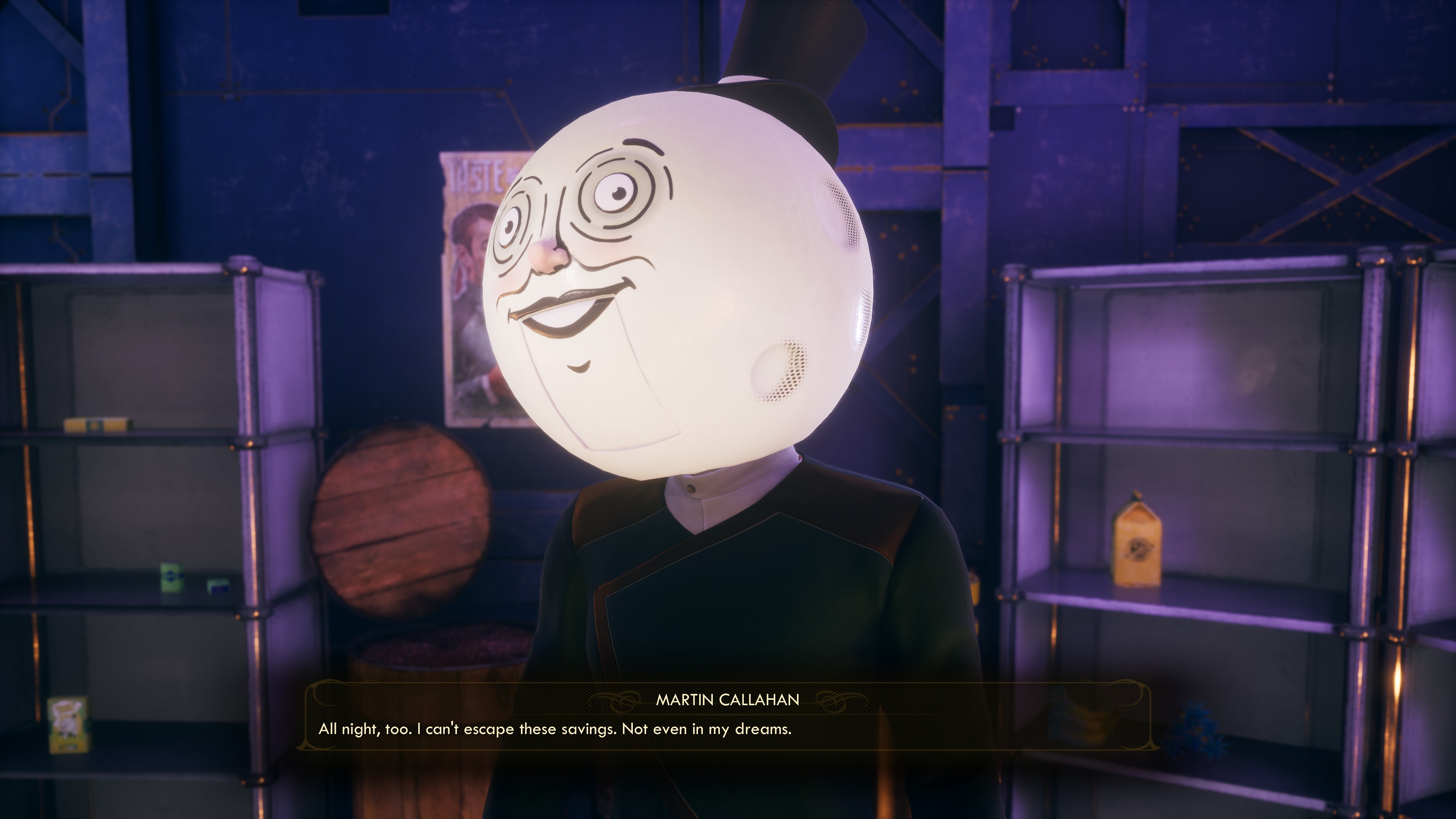
Also, and this is very much a personal thing, but I don’t like the aesthetic of The Outer Worlds at all. I find its colour scheme horrendously garish, a bizarre and ugly mixture of oranges, purples, greys, and browns, while darker colours are very smudgy and dull. That isn’t to say it can’t be visually impressive. I like the central deck of the Groundbreaker space station, illuminated like Times Square in holographic neon signage. I also like the enormous gas giant the moon Monarch orbits around, filling up half the skybox with its billowing stormclouds. But it doesn’t lessen the fact that the whole game has this sickly-coloured smear over it that I find very unappealing to the eye.
All this amounts to an experience where I never felt particularly involved in what was happening. I enjoyed individual lines of dialogue, but I never really cared about what people wanted from me or why they wanted it. I liked listening to my companions talk to one another, but I never felt like I got to know them in the way I did Garrus or Tali or basically anyone from Mass Effect. I was always excited to go to a new planet, asteroid etc., but once I got there, I never particularly wanted to see what was over the next horizon. I liked picking up new weapons, but combat never felt like more than an inconvenience in getting to my next objective.
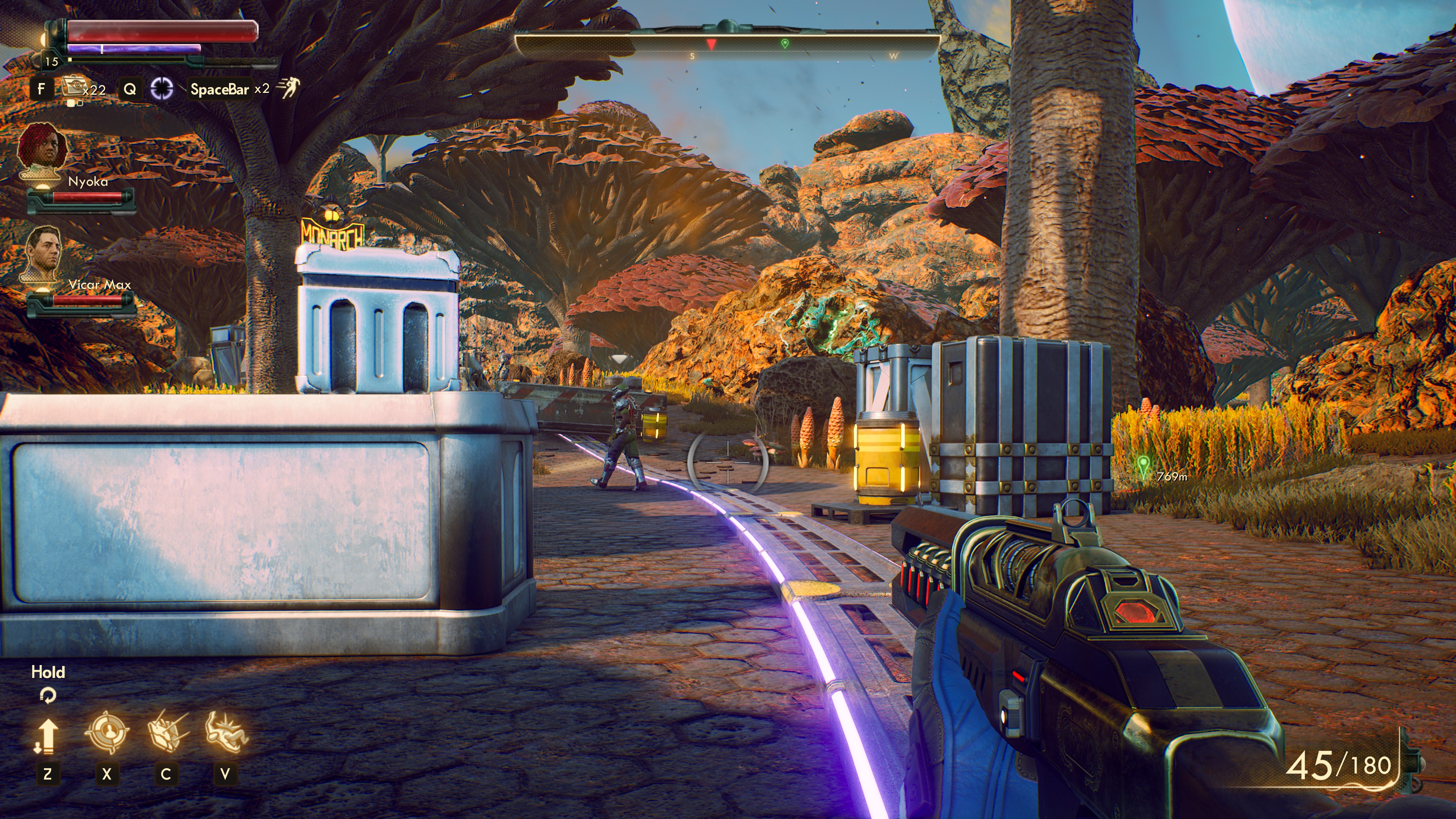
Having recently played the magnificent Disco Elysium, an RPG that is so transcendental, so dramatically different from any RPG I’ve played in years, I had to ask myself whether my disinterest in The Outer Worlds was simply a consequence of a post-Elysium comedown. But I think the problem is more that Fallout 4 felt like it was idling over when it released, and that was five years ago. The Outer Worlds bases huge chunks of its design on a game that, while still very popular, felt like it was slightly out of date half a decade ago.
This reveals itself in some of the game’s more frustrating elements. For example, don’t slap me with an arbitrary encumbrance stat when your game fundamentally involves hoovering up hundreds of individual items, forcing me to backtrack to a workbench to dismantle the weapons that I don’t actually need and only picked up so I could use their parts to repair the weapons I do need. Also, don’t force me to repair weapons! At least not unless that mechanic is intended to convey some sort of theme, like horror or survival. I don’t mind playing a nuts ‘n’ bolts RPG once in a while, but at least make sure those nuts ‘n’ bolts have a function, and aren’t just jamming the gears of your experience.
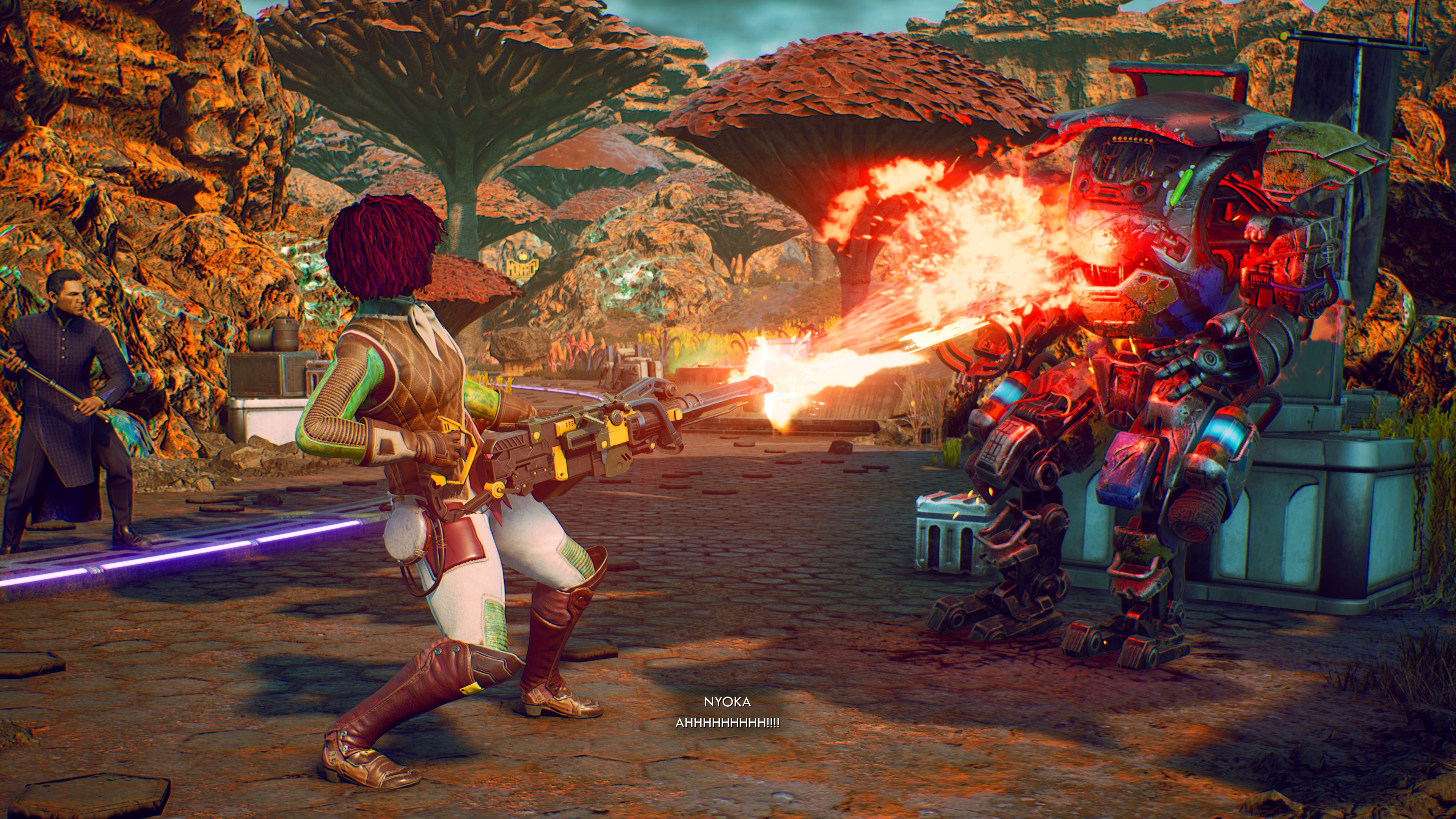
Ultimately, the problem with the Outer Worlds isn’t that it's copied Fallout, it’s that it's copied Fallout without making any effort to improve the fundamentals or address the primary flaws. For example, make walking around a town feel like I’m actually walking around a town. Give me a sense of footfall, give NPCs a routine to follow that makes them feel less like quest dispensers. Alternatively, make the combat snappy and engaging, make stealth about more than just crouching. I’d happily play an improved version of Fallout 4. But I don’t want to play Fallout 4 again with a slightly different theme.

MSI MPG Velox 100R Chassis Review
October 14 2021 | 15:04

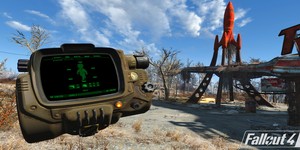






Want to comment? Please log in.